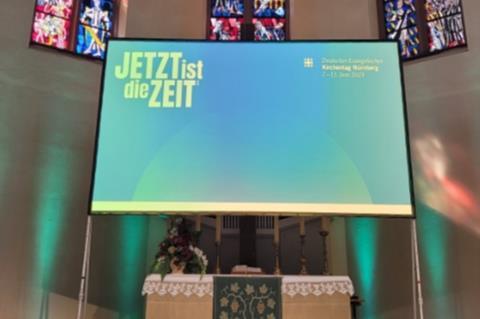As a consortium of AI experts warn of the risk of human extinction at the hands of AI, hundreds attended a church service in Germany generated and hosted by ChatGPT. How should Christians view such things, asks George Pitcher? Can we find a theology of AI?

The famous old saying about a computer playing chess is that it doesn’t care if it loses. Or if it wins, for that matter.
This observation is meant to distinguish the fundamental difference between the human mind and computer science. A computer never brings emotion to the party. If, in a not so distant future, we watch android footballers play a cup final to athletic perfection, there will be no tears of joy or sorrow at the final whistle.
Or, if there are, they will be artificially generated tears – and the same goes for the watching crowd, whether it’s made up of humans or robots. It’ll be hard to get worked up about a 90th-minute winner if it’s scored by superior software.
So emotion is what we cling to as the key differentiating factor in the development of artificial intelligence (AI). But it’s a false comfort. Because it’s the very absence of the human qualities of pity, compassion and empathy that feeds our fear of the future of AI.
An extinction event
It’s the lack of humanity that constitutes the threat to humanity. “It’ll never take over from humans” sounds like an over-complacent assurance when some 350 of the world’s most distinguished experts in AI warn, as they have recently, that mitigation of the risk of extinction posed by unrestricted AI “should be a global priority alongside other societal-scale risks such as pandemics and nuclear war.”
We may very well worship a God who is capable of letting humanity, in its free will, destroy itself
If there are world leaders capable of unleashing nuclear holocaust, then it’s not a fanciful leap of imagination to assume that a computer could also do so. Or develop insuperable biological warfare. The technology doesn’t need to take over from humans. It just needs to be in the wrong human hands.
Looking for the difference between human intelligence and AI will, therefore, frustrate the search for safeguards. A more fruitful quest might be to look beyond the human towards the characteristics of a universal mind behind the creation of all we see and seek to understand. I’m asking the question: Is there a theology for AI?
A theology for AI
At the heart of such a theology would be the question of fallibility. In evil human hands, AI could lead to the extinction of the human race, as those experts argue in their statement coordinated by the US Center of AI Safety (CAIS).
In a straightforward theological context, this relates to the fallen nature of humanity. It’s thoroughly postlapsarian, not to mention idolatrous, for humans to launch competitive experiments against the mind of God. But humankind has done that throughout history.
The comfort to be drawn here is that it’s the deeply imperfect up against the infinitely perfect. Ultimately, we might say, there can only be one winner in that contest - and it isn’t the mad scientist with super-intelligent software in military hardware.
But that begins to sound complacent again. Not least because of the unimaginable suffering that could be unleashed along the way. But also because we may very well worship a God who is capable of letting humanity, in its free will, destroy itself and starting again from his pre-existent nothing.
So trust in God may fall short as a rubric for addressing a theology of AI. It might be better to compare and contrast not human efforts with the divine, but the nature of infinite intelligence with human-created artificial intelligence.
Looking for love
To this end, one might turn to the theology of the apostle Paul. A favourite choice at weddings is the reading of 1 Corinthians 13 in its entirety, Paul’s prose hymn to love in an otherwise rather lacklustre letter about church administration.
It’ll be hard to get worked up about a 90th-minute winner if it’s scored by superior software
In it, the apostle contrasts human understanding with the divine; how in this life we understand only “in part”, as if trying to peep at the divine through a mirror - which is pointless, as we see only our own reflection. But when we meet the divine face to face, we will finally understand – and only then.
Paul is human and therefore fallible, but this does seem to point to a satisfactory distinction between artificial and divine intelligence. And the only way that Paul can achieve that is to point at sacramental qualities that are gifted exclusively by the divine into its humanity: “Faith, hope and love.”
The last of these – love - is why it’s a wedding favourite. But the original Greek word is agape, not the eros of romantic love. This translates in Latin as caritas, which gives us “faith, hope and charity” in the King James Version of the epistle.
This is the love of God that overflows into the world through human creation. So “these three abide, faith, hope and love. But the greatest of these is love.” That love has only one source. And it can’t be created artificially.
Ultimately, it provides the “guard rails” that CAIS recommends we find. Because it offers an alternative to all human existential risks, of which AI is just the latest.





































No comments yet